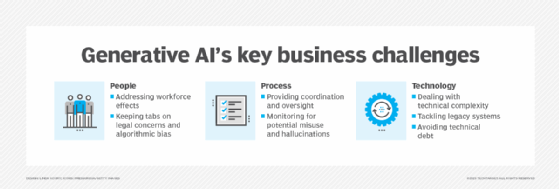
sdecoret - stock.adobe.com
AI hype far exceeds its use within enterprises
Experts say most organizations are holding back on spending while investigating the cost, legal liabilities and data privacy risks associated with generative AI use.
Despite burying enterprises under an avalanche of generative AI hype, technology companies still need to convince them to increase IT spending to adopt the technology.
Organizations interested in AI want to understand its costs, legal liabilities and data privacy risks before adding generative AI to IT budgets, experts said. Many enterprises also need time to ready their IT platforms for AI.
"Most enterprises will incorporate generative AI in a slow and controlled manner through upgrades to tools that are already built into IT budgets," Gartner analyst John-David Lovelock said in a statement this week.
Generative AI's cost is a significant factor because of high inflation and interest rates, said Bethan Williams, global portfolio lead for applications and data consulting at Dell Technologies.
"It's quite interesting at the moment because we've got this huge excitement around generative AI, but we also have huge global pressures around cost and around investments," Williams said. "Everybody wants to do this, but they don't necessarily have the time and money to do it."
Enterprises are increasing spending on CRM and ERP for business operations efficiency this year instead of AI. Together, they'll drive a 13.5% increase in software spending globally to $911.7 billion, Gartner said.
Nevertheless, enterprises are looking closely at generative AI as a tool for driving immense efficiencies in business processes related to employees, partners and customers. In May, a Gartner poll of more than 2,500 executives found that 70% were in the investigative stage of generative AI, while 19% were either piloting the technology or had it in production.
But for many companies, a lot of IT changes are needed first. Customers of IT consulting firm CGI, for example, face the arduous task of formatting their data for use in generative AI applications, said Douglas Vargo, vice president of the company's emerging technology practice.
"They want to take advantage of all these technologies, but their fundamental data management is still subpar," Vargo said. "We're going in there talking about generative AI and really working backward."
Also, even if organizations wanted to run generative AI applications on a cloud provider, they would have difficulty finding enough GPU clusters to run the software, experts said. Cloud providers haven't built enough AI capacity to meet the current demand from startups and the largest enterprises that have used other forms of AI for years. They include large manufacturers, oil and gas companies, pharmaceutical firms and government agencies.
"We have instances of folks going in and saying that pretty much all of the [Nvidia] A100s in a particular region were unavailable because some startup or other company went in and took all of them," said Kjell Carlsson, head of AI strategy at Domino Data Lab, a platform provider for data science teams.

While they're not ready to deploy AI today, enterprises need an AI plan to satisfy investors who see it as a must-have, transformative technology.
"When it comes to AI this year, organizations can thrive without having AI in production. But they cannot be without a story and a strategy," Lovelock said.
Total IT spending worldwide will increase by 4.3% to $4.7 trillion this year, Gartner said. IT and communication services sales will increase by 8.8% and 2.7%, respectively. The two remaining categories, data center systems and devices, which include PCs and smartphones, will fall 1.5% and 8.6% respectively.
Antone Gonsalves is networking news director for TechTarget Editorial. He has deep and wide experience in tech journalism. Since the mid-1990s, he has worked for UBM's InformationWeek, TechWeb and Computer Reseller News. He has also written for Ziff Davis' PC Week, IDG's CSOonline and IBTMedia's CruxialCIO, and rounded all of that out by covering startups for Bloomberg News. He started his journalism career at United Press International, working as a reporter and editor in California, Texas, Kansas and Florida. Have a news tip? Please drop him an email.






